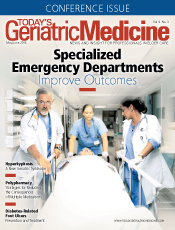
November/December 2016
November/December 2016

- Combating Counterfeit Drugs
Many older adults, unable to afford necessary medications, access unregulated drug suppliers that provide impure or unsafe drugs to unsuspecting patients.
- Could Anticoagulants Improve Communication in Dementia?
Effective atrial fibrillation management shows promise for improving cognitive and communication difficulties. For patients with dementia symptoms, consider ruling out atrial fibrillation as a contributing factor to cognitive decline.
- Cognitive Training to Oppugn Alzheimer's Disease and Dementia
A comprehensive group of challenging activities targeting reaction time, visual spatial acuity, attention and concentration, memory, language, and problem-solving has met with success in improving communication and interaction among patients with Alzheimer's disease.
- Negative Pressure Wound Therapy for Wound Treatment
With significant success, negative pressure wound therapy improves recovery rates of difficult-to-heal wounds such as decubitus ulcers.
Departments
From the Editor
When Economics Dictates Difficult Choices
News Brief
One in Four Older Adults Hasn't Discussed Advance Care Planning
Medication Monitor
Drug Diversion by Health Care Professionals
Research Review
New Guidelines on Nutrition Support for the Critically Ill
Nutrition
Nutrition for Arterial Health
Alzheimer's Update
The 5 Love Languages and the Alzheimer's Journey
Vintage Voices
Better Oral Health Means Better Health

September/October 2016
September/October 2016

Departments
From the Editor
On the Road to Elder Safety
Medication Monitor
Fluoroquinolone Antibiotic Risks
Long Term Care
Discussing a "Good Death" With Patients
Clinical News
Neuroprosthetic Implant Improves Walking Ability in Stroke Patients
Research Review
New Approach to Assess Elders' Balance
Vintage Voices
Pain and Adverse Drug Reactions

July/August 2016
July/August 2016

Departments
From the Editor
Diabetes Management's New Frontier
Medication Monitor
Specialty Drugs: Growing Segment of Pharmacy Spend
Clinical News
Primary Progressive Apraxia of Speech
Alzheimer's Update
Brain Health's Triple Aim
Nutrition
Questions on Calcium and Vitamin D Recommendations
Datebook
Vintage Voices
A Geriatrician's Confession

May/June 2016
May/June 2016

- Specialized Emergency Departments Improve Outcomes
Older adults presenting in emergency departments (EDs) are unique among patients, often requiring specialized care and treatment. Medical professionals who have designed and launched a geriatrics-friendly ED describe the challenges in and benefits of a customized ED.
- Hyperkyphosis: A New Geriatric Syndrome
For 20 years, hyperkyphosis, a thoracic spine curvature that often goes undiagnosed and untreated, has been the research focus of Deborah Kado, MD, MS. Geriatrician Diane L. Schneider, MD, MSc, discusses with Kado the importance of recognizing and treating the condition.
- Diabetes-Related Foot Ulcers: Prevention and Treatment
Routine comprehensive foot examination and risk assessment are essential to preventing diabetes-related lower extremity complications and formidable foot ulcerations.
- Polypharmacy: Strategies for Reducing the Consequences of Multiple Medications
Conducting medication reconciliations at care transitions, eliminating duplicate medications, assessing for drug-drug interactions, and reviewing dosages can reduce the incidence of polypharmacy, ensure patient safety, reduce hospitalizations, and decrease associated costs.
Departments
From the Editor
A Winning Combination
Alzheimer's Update
Use It or Lose It: Redefining an Old Idea
Medication Monitor
Improve Medication Management to Reduce Rehospitalizations
Innovations in Geriatrics
Frozen Fecal Microbiota Transplantation
Clinical News
Practical Solutions to Rural Elders' Health Outcomes
Datebook
News Brief
Vintage Voices
Creative Rounding

March/April 2016
March/April 2016

- Chronic Musculoskeletal Pain: Initial Pharmacological and Nonpharmacological Therapies
Increasing incidence of harmful side effects and medication interactions associated with prescription medications have led to growing support of the use of over-the-counter medications and nonpharmacological multimodal therapies to treat chronic musculoskleletal pain.
- Managing Difficult Behaviors in Dementia
Successful strategies employed in addressing undesirable dementia behaviors include ensuring needs are met, using reassuring language, changing environments, and engaging in soothing activities. Caregivers must employ patience and persistence to identify clues to undesirable actions.
- Over-the-Counter Sleep Aids
Difficulty sleeping is a common complaint among significant numbers of older adults. Providers must carefully assess patients, their specific complaints, and the risks and benefits related to possible remedies.
- Tai Chi Intervention Reduces Fear of Falling
Specialized interventions can help to reduce older adults' fear of falling, which can result in reducing the incidence of falls.
Departments
From the Editor
Prudent Pain Relief
Clinical News
Namaste Care Improves Quality of Life for Dementia Patients
Alzheimer's Update
Toward Dementia Diagnosis via Artificial Intelligence
News Briefs
Medication Monitor
Pain Management in Hospice Care
Research Review
Diagnosis and Treatment of Pseudobulbar Affect
Datebook
Vintage Voices
Challenges in Prescribing Statins to the Elderly

January/February 2016
January/February 2016

Departments
From the Editor
Elevating Medication Safety
Nutrition
Improving Patient Compliance With Dysphagia Diagnosis
Medication Monitor
Medication Disposal Challenges in LTC
Alzheimer's Update
Exercise's Impact on Cognition
Innovations in Geriatrics
Magnetic Resonance–Guided Focused Ultrasound Therapy for Essential Tremor
Vintage Voices
Promoting Advance Care Planning |

